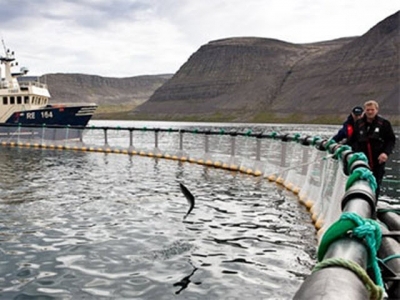Iceland looks to the future of aquaculture

Salmon farm. (Photo: Arctic Salmon)
A working group appointed by the Ministry of Fisheries has delivered its findings, stating the obvious with its conclusions that the establishment of a heavyweight aquaculture industry should be done alongside protecting natural environments and upholding sustainable practices.
The group is made up of representatives of stakeholders – including bodies representing the aquaculture sector and the sport salmon fishing sector, as well as the Ministry of the Environment and the Ministry of Industry and Innovation, which has fisheries and agriculture within its remit.
The working group’s findings are that aquaculture can be built up in areas suitable for such activities, supporting employment in those regions, as long as environmental and sustainability criteria are adhered to. It is also noticeable that the working group saw fit to mention the aspect of reaching agreement over setting up an aquaculture industry, pointing out that this is not only necessary for the various stakeholders but also for the marketing possibilities for Icelandic production which relies strongly on its environmentally-friendly image. For these reasons, the working group has determined that science needs to be the driver behind building up aquaculture.
"It is clear that the potential is there for aquaculture to become a serious and important industry," commented fisheries minister Thorgerður Katrín Gunnarsdóttir.
"However, we must take care to ensure that this is done on the basis of scientific understanding, with the focus on sustainability and protection of the environment. This will now be discussed in Parliament and I hope that cross-party agreement can be reached on the subject of building up aquaculture, as has been reached between the stakeholders participating in the working group," the minsiter added.
The working group’s recommendations refer to aspects of such development including resource levies, environmental impact assessments, genetic mixing, issuing of licences, control and transparency in making data available.
Related news
 Innovation projects: ‘groundbreaking’ for Norwegian aquaculture
Innovation projects: ‘groundbreaking’ for Norwegian aquaculture On Tuesday, the Minister of Fisheries, Per Sandberg, announced that he has allocated eight new development permits, giving the go-ahead for the construction
 5 Things I Learned While Attempting Backyard Aquaculture
5 Things I Learned While Attempting Backyard Aquaculture Fish farming has a poor reputation: antibiotic-dependent, polluting, and reliant on industrially produced corn and soybeans to fatten the fish
 The Best Fish Species for Backyard Aquaculture & How to Source Them
The Best Fish Species for Backyard Aquaculture & How to Source Them The large-scale hatcheries that supply fingerlings for recreational fishing in rivers and lakes may not be of much help either.